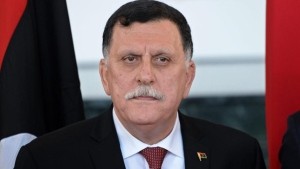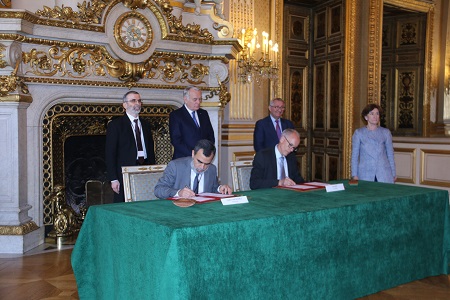By Sami Zaptia.

Malta, 30 May 2016:
On the 30th March this year the much heralded arrival from Tunis of Faiez Serraj and . . .[restrict]his Presidency Council (PC) finally happened.
The arrival brought with it much hope and anticipation for Libyans living in a state of limbo since the summer of 2014 when GNC-backed militias led by Salah Badi from Misrata led the ‘’Libya Dawn’’ operation against Zintani militias in Tripoli.
The militia invasion led to the partial destruction of Tripoli’s oil storage tankers on Airport Road, the destruction of several of Libya’s fleet of aircraft belonging to state airliners Libyan Airlines and Afriquiya, as well as the total destruction of Tripoli International Airport.
The militia invasion also destroyed Libya’s democracy, its political legitimacy and its social contract built on the Transitional Constitutional Agreement of August 2011, the 2012 elections, as well as at a stroke annulling the results of the 2014 House of Representatives elections.
The Libya Dawn coup d’état also left its psychological scars on the Libyan public still grappling with the post Qaddafi state of affairs and unclear about a new vision for their nation.
The militias and the rump of the outgoing GNC reformed a parliament in Tripoli and set up a banana republic Salvation Government in the capital which failed to gain any international recognition.
After costing the outgoing UN SRSG Bernardino Leon his job, the new UNSMIL head Martin Kobler took over in November 2015 and succeeded in getting the protagonists to sign the LPA under the leadership of Tripoli HoR member Faiez Serraj.
However, two months on, and Serraj is still ‘’hiding’’ as Libyan critics put it, in the Bu Sitta Naval Base sending a signal, and confirming to many that Tripoli is still insecure.
None of the European embassies that had bailed out of Tripoli in 2014 have returned and even Kobler and his UNSMIL team are reluctant to return full time to their Tripoli HQ.
Crime, insecurity and kidnappings are still high, if not higher, since Serraj’s arrival on the last day of March. Power cuts are definitely worse reaching up to 11 hours in Tripoli last week, with some outlying areas suffering for 24 hours at a time in temperatures nearing 40 degrees.
Economically. Libyans are not fairing any better with their spending powers drastically eroded as inflation has rocketed reflecting high prices as a result of the soaring black market exchange rate.
With the exception of hydrocarbons, Libya is a net importer of goods, including almost all of its consumer goods and food products. The tripling of the black market exchange rate from LD 1.30/40 per dollar to anything from LD 3.00 to over 4.00 has affected prices across the board for Libyan consumers.
Another side effect has been the loss of confidence in the political and financial situation in the country by Libyan citizens, leading to them hoarding their cash and refusing to deposit it into their bank accounts which has led to cash crises at the banks. Many Libyans complain of depression, loss of hope, and having to constantly live in fear of crime and kidnapping.
Kidnapping gangs have increased and become specialized with the ones lower down the food chain kidnapping victims and then selling them for a small fee to the bigger fish. An elderly neighbour of this writer was imprisoned two weeks ago in a disused industrial fridge with one bottle of water for two days in the Libyan heat. The kidnappers asked initially for a cool million, but settled for LD 250,000 thanks to great tribal and militia contacts and pressure.
The fundamental problems are still there. Libya’s oil production still at around 27 percent (300,000 bpd) of the 2012 post Qaddafi peak of 1.5 million barrels with militia strongman Ibrahim Jadran still refusing to reopen all the oilfields and the foreign oil companies unable and unwilling to return to service and restart the stalled fields.
Meanwhile, Libyans are tired of seeing Faiez Serraj, Ahmed Maetig and the rest of the Presidency Council spending all their time flying from one meeting to another and from one foreign capital to another. They complain that they see more of them on official visits on TV than in person in Libya.
The UN-brokered Libyan Political Agreement (LPA) signed in December 2015 in the Moroccan city of Skhirat which was supposed to be an inclusive compromise deal has so far failed to unite the divided Libyan parties.
In the western region, Zintan is still allied with the east, Hafter and the House of Representatives and its PC representative is still boycotting the LPA deal.
Indeed, the fight to liberate Sirte from IS/DAESH has only contributed to the further polarization between the west and Hafter and the HoR in the east. The east accuses the UN’s Kobler of selling his soul to a mix of the Islamists, Misrata and its militias led by Abdelrahman Swehli in the west.
They are particularly annoyed that instead of using Hafter’s LNA as the foundation of a new GNA army, the Tripoli-based GNA has instead adopted existing militias as an army. Many of these militias are deemed the very militias that had invaded Tripoli in summer 2014 to overthrow democratic legitimacy. Moreover, Hafter wants to be the head of a new GNA army.
The western authorities and the GNA are, on the other hand, still uncomfortable and unwilling to accept Hafter. Tripoli militias and Misrata still see Hafter as a pro Qaddafi force and are unwilling to compromise with him, despite agreeing to the LPA.
Relations between Hafter and Kobler have been strained recently as Kobler is seen as siding with the militias instead of the LNA. Hafter refused to meet the UNSMIL man earlier this month. A few days later Zintan turned away Kobler’s military advisor Paolo Serra when his plane landed in Zintan for a visit. Kobler is now seen as being aligned with Misrata and its militias propping up the Tripoli GNA.
An attempt by the eastern-based Central Bank of Libya (CBL) to introduce newly printed banknotes ordered autonomously by the east has threatened to officially split the two regions as it was claimed that there would now be two separate currencies in Libya – a currency being a major indicator of independence and sovereignty.
Last week Hafter’s Libyan National Army Chief-of-Staff Abdul Razak Al-Nazhuri visited Zintan and Azzizia south of Tripoli and warned that their LNA forces are only 10 km away from Tripoli ready to liberate the capital soon.
The two months since the arrival of Serraj and his PC at the Naval Base in Tripoli seem to have flown bye with little quick wins promised by the international community on the ground. The LPA that was supposed to be a compromise political agreement has so far failed to bear fruit.
The only winners, Libyans worry, will be the international community who may get their solution for fighting IS in Sirte and a deal to limit illegal migration sailing from Libya – while the Libyans are still left stuck even deeper in their political quagmire. [/restrict]







